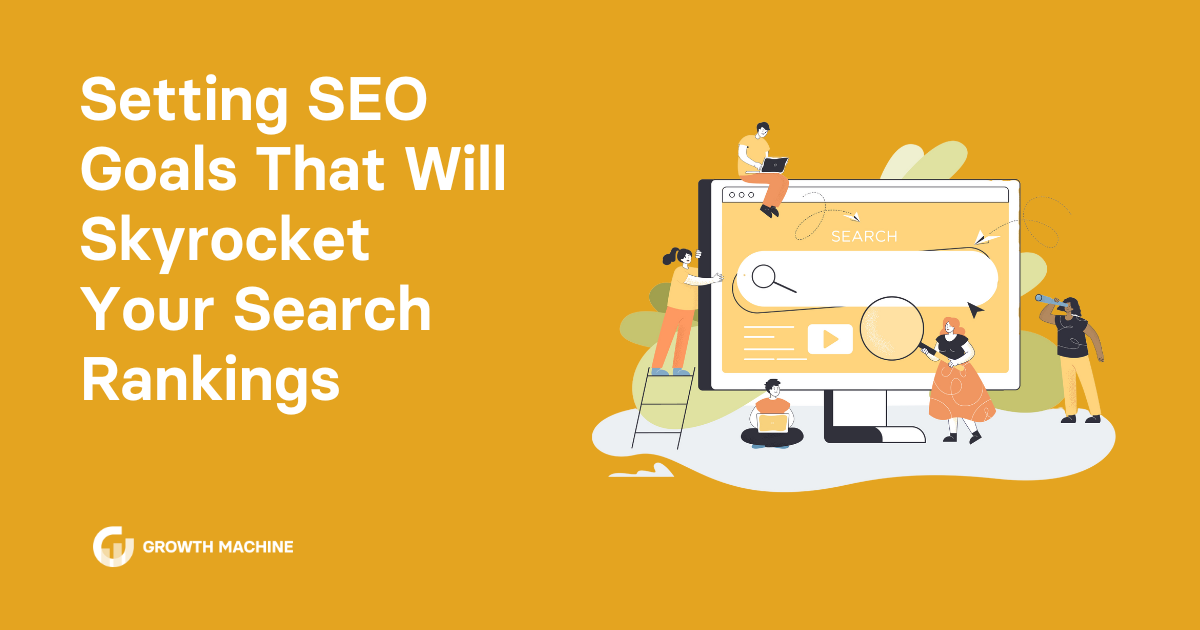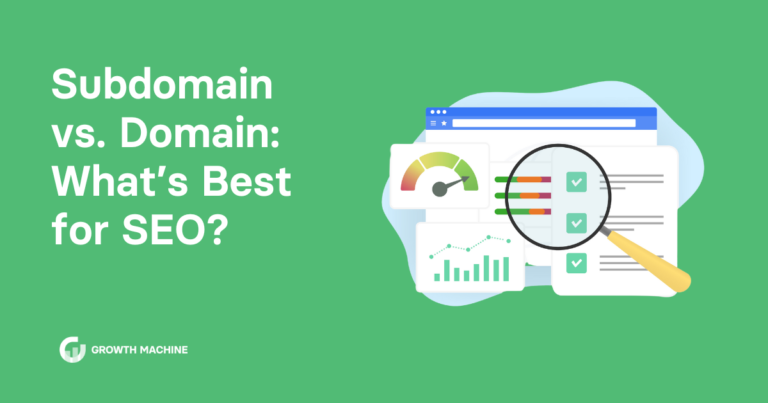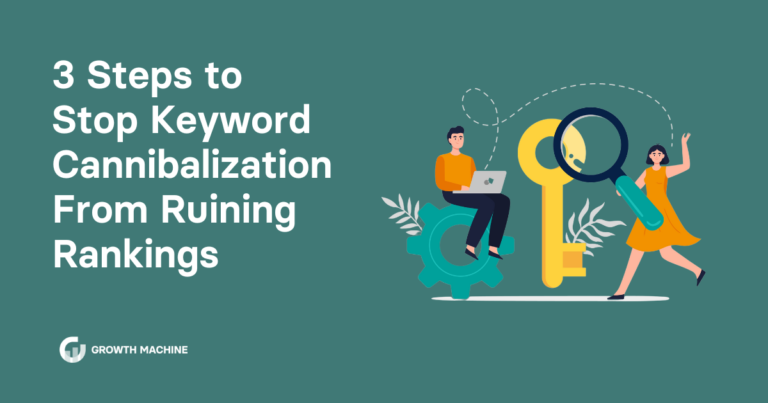Setting SEO Goals That Will Skyrocket Your Search Rankings
Implementing a brand-new search engine optimization (SEO) strategy without clear goals is like embarking on a road trip without a GPS or a map. If you don’t have an understanding of where you’re going and how to get there, you’ll end up burning a whole lot of time — and gas — without ever reaching your final destination.
To avoid wasting your team’s precious time and resources, you need to set clear and effective SEO goals. With these SEO objectives leading you forward, the road to better search rankings will become clear, and your destination will be within reach.
The 4 Pillars of SEO
If you’re new to the world of SEO, there are four main components of search engine optimization you should familiarize yourself with. Well-crafted SEO goals should touch upon all aspects of these.
1. Content creation: High-quality content is the foundation of SEO. Creating content that’s consistent, valuable, and relevant for a clearly defined audience is the best way to boost your search rankings.
2. On-page SEO: This refers to enhancing individual web pages so they rank higher in search engine result pages, or SERPS. This is done by improving content quality, incorporating keywords that your audience is likely to use in their online searches, and including HTML tags.
3. Off-page SEO: Actions that are taken outside of your website impact your search rankings, too. This mainly refers to securing quality links through backlink outreach, as well as building a positive reputation in your industry or niche.
4. Technical SEO: By optimizing your website’s technical elements, you can boost search engine rankings and allow your best content to shine. These technical elements include site speed, mobile-friendliness, blocking robots, and indexing.
The Importance of SEO Goals
Now that you have a better understanding of what SEO encompasses, let’s talk about why SEO goals are so important for your business.
For businesses with a digital component, whether it’s an e-commerce store or for B2B lead generation purposes, a strong online presence that drives growth is paramount.
Even if you operate a more traditional brick-and-mortar store, optimizing your content so that it appears in local Google search results is critical for customers to be able to find you. There’s really no escaping SEO if you want to outrank the competition and ultimately drive more conversions via your website.
SEO goals help you achieve this by providing a clear direction and focus for your digital marketing efforts. They can help you prioritize tasks, allocate resources effectively, and steer your SEO strategy toward specific outcomes.
On the other hand, if you don’t have established SEO goals, you may lack purpose and direction, which leads to wasted resources and missed opportunities.
3 Main Types of SEO Goals
It can seem daunting to learn exactly how to optimize your website for search engine algorithms. With so many levers to pull, from content creation to technical SEO, it can feel overwhelming just figuring out where to begin.
To simplify things, here are three larger goals to consider in your overall marketing strategy.
1. Improving website visibility: In the digital space, competition is fierce. The goal of SEO should always be to enhance your site’s presence in search engine results. This makes it easier for potential customers to find you and gives you a competitive edge.
2. Increasing organic traffic: Your SEO goals should yield the highest possible returns for your business. That means attracting more of the “right” kinds of visitors (aka, people who are ready to buy) and getting them to click on your site organically, so you can focus your marketing spend on growing other areas of your business.
3. Enhancing the user experience: Setting goals around page load speed, mobile responsiveness, and generating valuable content makes it more likely that visitors will have a positive experience on your site. This leads to increased engagement, higher conversion rates, and a greater chance that customers will return to do business with you again.
Setting SMART SEO Goals
Like any business goal you set, your SEO goals should meet the SMART criteria.
- Specific: Focus on setting specific goals for SEO that are well defined and detailed, rather than broad and vague. For example, rather than saying “We want to increase website traffic from social media,” you can set a goal of “driving 100 more landing page clicks from Facebook each month.”
- Measurable: Each goal should have a metric or a key performance indicator (KPI) against which you can measure success. Examples of qualities you can measure include website visitors, page views, and bounce rates, all of which you can review and assess over time.
- Achievable: Set realistic goals that are achievable within your team’s current capacity and budget. If your team doesn’t have the capacity to create a new piece of content every week, scale it back to something more reasonable (or hire an SEO agency to do some of the heavy lifting instead).
- Relevant: Your SEO goals should always align with your overall business objectives. If your goal is to acquire more leads for your business, your SEO campaigns should be optimized for actions like increasing the number of website visitors who fill out a contact form or request a free consultation call.
- Time-Bound: There’s a well-known saying that “A goal without a deadline is just a dream.” Don’t let your SEO goals be dreams — assign weekly, monthly, and quarterly deadlines to each goal to ensure timely execution and evaluation.
5 Strategies to Reach Your SEO Goals Faster
Planning is just the start when it comes to SEO. Once you’ve set some preliminary SEO goals for your business, here are five strategies to help you start executing on those objectives.
1. Prioritize High-Quality Content Creation
The success of any SEO goal depends heavily on your website’s content. Without great content, your SEO efforts will most likely go to waste.
Here’s why: You can do all the technical SEO and linkbuilding you want, but if you’re lacking content that provides real value or isn’t relevant to visitors, they’ll likely leave your site as quickly as they arrived.
Focus on creating high-quality, engaging content that both attracts and retains visitors. To do this, your content should answer pressing questions or solve a problem that your audience has.
A content partner like Growth Machine can help you develop content that speaks directly to your audience’s needs, just like we did for this recruiting website, which resulted in triple the organic traffic in six months.
2. Use Keyword Research to Your Advantage
No SEO strategy would be complete without keyword research. Equipped with the right target keywords, you can outrank the competition and climb the SERPs relatively quickly.
Start by brainstorming a list of terms and phrases searchers might use to find your products or service, focusing on user search intent. Are searchers looking for general information, doing research on where to buy, or trying to make an actual purchase? Take this into account when selecting your keywords.
If you’re feeling a bit stuck, a keyword research tool like Google Keyword Planner, SEMrush, or Ahrefs can provide a solid starting point.
3. Continually Work to Improve On-Page Optimization
Your SEO goals will likely include improving your search rankings and earning more targeted traffic. To do that, you need to make sure your website pages are optimized for both humans and search engines.
Key aspects include:
- Title tags and meta descriptions: Remember those keywords we talked about? You’ll want to craft compelling, keyword-rich title tags and meta descriptions that draw people into your content.
- Headings and subheadings: For a better user experience and navigability, always utilize H1, H2, and H3 tags in your content structure.
- URL structure: Your content and webpage URLs should be short and descriptive, and include relevant keywords.
- Internal links: Use these links to connect to other relevant content and to guide users through your site.
4. Employ Linkbuilding
High-quality backlinks from reputable sites are essential if you want to achieve your SEO goals.
Not only do these links boost your site’s authority and rankings, but they’re also key to building credibility and trust with your audience.
When acquiring backlinks, here are a few tips:
- Strive for quality over quantity: A few high-quality links from reputable and relevant websites are more valuable than tons of low-quality ones.
- Try guest blogging: Producing valuable content for other sites is a great way to build relationships in your industry, get your name out there, and secure a nice link to your site.
- Hunt down broken links: If it’s broken, fix it — with your content, that is. Reach out to other websites and offer up your content as a replacement for their broken links.
- Conduct cold outreach: The worst someone can say is no, so don’t be afraid to reach out to website owners and ask them to publish some of your content, such as a blog post, for example. Explain how your content can enhance their visitors’ experience, or offer to include a link to their content on your site in return.
5. Don’t Forget About Mobile Optimization
Last but certainly not least, your site needs to be mobile-friendly if you want to reach your SEO goals.
After all, 92.3% of users access the internet with a mobile device. Having a mobile-friendly website is no longer an option — it’s a necessity.
When optimizing your website for all those smartphone users, consider the following.
- Responsive design: Your site design should adjust your website’s layout and content to fit all different types of screen sizes and devices.
- Page load speed: A slow-loading page can negatively impact your user experience and, in turn, your search rankings.
- User experience: When it comes to navigating a website, a simple structure is best. Aim to use readable fonts and double-check that buttons and links are easy to tap on a mobile screen.
- Mobile-first indexing: Search engines like Google predominantly use the mobile version of content for indexing and ranking. To boost SEO, always go for a more intuitive navigation.
3 Steps to Measuring the Progress of Your SEO Goals
Setting strong SEO goals is only half the battle. The other half is tracking and analyzing your performance to make sure you’re on the right course.
Let’s break this process down.
1. Establish Benchmarks and KPIs
Before doing a deep dive of your analytics, establish benchmarks for some key performance metrics. These will serve as a baseline against which you can measure progress.
Typically, your benchmarks should be derived from historical data — that is, how your site performed before setting your new goals.
Below are a few metrics you may want to consider.
- Organic traffic: This is the number of visitors coming to your site via search engines. Look for notable trends over time, and identify which pages are driving the most traffic.
- Bounce rate: This refers to the percentage of visitors who navigate away from your site after viewing only one page. High bounce rates indicate that visitors aren’t finding value in your content or that your user experience is lacking. Evaluate pages with high bounce rates to identify areas for improvement.
- Conversion rate: You may get many visitors to your site, but this measures the percentage of visitors who take the desired action (e.g., make a purchase or book a free consult call). Look at conversion rates for organic traffic specifically, and consider if your offers or call-to-actions are clear enough.
- Keyword rankings: This is determined by the position your site holds in search engine results for your target keywords. Monitor changes in your rankings and investigate the reason for any ranking drops (such as algorithm updates or increased competition).
- Page load time: A fast loading time is essential. How quickly your webpages load has an impact on your overall user experience and search rankings, so look for patterns and nip issues like large file sizes in the bud.
2. Leverage SEO Tools to Measure Progress
Thanks to technology, tracking your SEO goals has never been easier. Here are some tools and platforms that can help you analyze your SEO metrics.
- Google Analytics: Set up your SEO goals in Google Analytics to help you track various metrics, such as traffic, bounce rates, and conversions, including form submissions or e-commerce transactions.
- Google Search Console: Another Google tool, this is a great place to gain deeper insight into your search rankings, track keyword performance, and diagnose any site health issues promptly.
- Ahrefs/SEMrush/Moz: These are our go-tos when it comes to keyword tracking, competitor research, and backlink monitoring.
- Google’s PageSpeed Insights and GTmetrix: These tools can help assess the well-being of your website, allowing you to rapidly diagnose and repair any issues with page speed or user experience that might affect your ranking.
3. Review and Adjust
You can’t know where you’re going without understanding where you’ve been. In this case, that means staying informed about your SEO performance so you can spot any gaps and make changes as needed.
Sit down with your marketing team and establish a regular reporting period — weekly, monthly, or quarterly — in which you’ll review your SEO goals.
Use reports from the tools mentioned above to review your progress. Are you on track to hit your goals, or do you need to adjust your strategy? By scheduling regular intervals for analysis in the calendar, you can pivot quickly and seize new opportunities.
Put Your SEO Goals in Motion With Growth Machine
Now that you’ve set clear and measurable SEO goals, why not ensure the rest of your online presence is up to scratch?
Our team of SEO experts is here to help! We know you’re busy, so we’ll implement your SEO strategy, create high-quality written content, and keep an eye on your metrics to ensure that your efforts don’t go to waste.
If you’re ready to get started, reach out to a member of our team at Growth Machine now, and watch your online presence grow.







